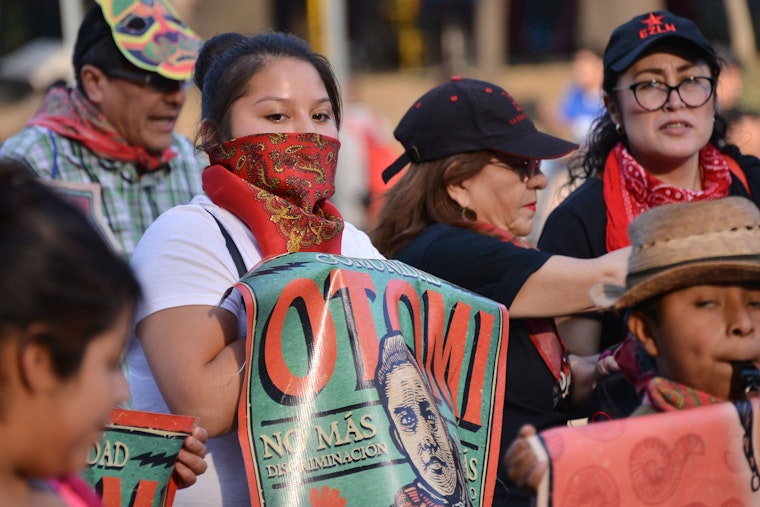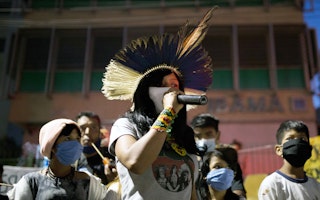Q&A: Fighting for Climate Justice in the Caribbean

Latin America and the Caribbean are among the most sensitive regions to climate-related disasters on the planet. In March 2018, the region adopted a treaty known as the Escazú Agreement—named for the place in Costa Rica where it was signed—which seeks to protect environmental defenders in their fight for climate justice, and ensure that vulnerable communities in the area have a voice in decisions affecting the environment they live in. While 25 countries in Latin America and the Caribbean have signed the agreement only about half of them have ratified it.
We spoke with Nicole Leotaud, executive director of the Caribbean Natural Resources Institute, about the current state of the agreement, the challenges involved in its implementation, and its value for the region.
What is the Escazú Agreement and why is it important to the Caribbean?
The Regional Agreement on Access to Information, Public Participation and Justice in Environmental Matters in Latin America and the Caribbean, as it is officially known, is a treaty that holds governments responsible for protecting the environment. It will help deliver commitments made under the Multilateral Environmental Agreements, which are aimed at addressing climate change, conserving biodiversity, protecting oceans, safeguarding food and water security, preventing pollution, managing waste, and ensuring that sustainable development in the Caribbean delivers benefits in line with the Sustainable Development Goals for People, Planet and Prosperity. The Escazú Agreement is the first of its kind in this region, and the first in the world to lay out specific protections for environmental defenders, and it covers both environmental and human rights.
That’s especially important for the Caribbean, whose culture, economy, and livelihoods center on our natural heritage. In 2012, nine Caribbean countries—Antigua and Barbuda, Dominica, Dominican Republic, Grenada, Jamaica, Saint Lucia, St. Kitts and Nevis, St. Vincent and the Grenadines, and Trinidad and Tobago—served on a committee to craft the treaty’s language. The latter two countries presided over the treaty’s negotiation process, and I’m proud to say Guyana was the first nation to ratify the agreement once it was opened for signature in 2018. Since that time, another 14 countries have followed suit, and half are Caribbean. Those are Antigua and Barbuda, Belize, Grenada, Guyana, Saint Lucia, St. Kitts and Nevis, and St. Vincent and the Grenadines. Dominica, Haiti, Jamaica, and Dominican Republic have signed, but not yet ratified, and we have yet to obtain a formal commitment from the governments of The Bahamas, Barbados, Cuba, Suriname, and Trinidad and Tobago.
You were elected to be one of the six representatives under the agreement to provide a channel for citizens’ demands. Why is it important to have “the public” involved in this agreement? What will you be doing? What are your own priorities in this role?
Elected representatives encourage and facilitate public participation in the implementation of the agreement. But the Caribbean is made up of 45 million people, so the clear priority for us as representatives is to support and amplify the voices of the most vulnerable stakeholders. To do that, it’s critical that we create opportunities for regional, national, and local civil society organizations to mobilize around and engage in the agreement. Right now, we don’t have many civil society organizations engaged in these processes, so I hope to improve that by focusing on four related areas. First, we need communication to help Caribbean civil society understand what the Escazú Agreement does. Second, we need capacity building to empower civil society and citizens to take action to enhance their access to information, participation in environmental decision-making, and ability to seek justice in environmental matters. Third, we need to mobilize civil society organizations, youth, social movements, vulnerable groups, and environmental defenders to champion and advocate for Caribbean governments to sign and implement the agreement. And finally, if we want to build a powerful social movement, we need to facilitate greater collaboration at the local, national, and regional levels.

What are the greatest challenges for Caribbean countries in terms of ratifying the agreement and implementing it?
The biggest challenges for Caribbean countries are in the institutional environment as well as in the capacity of civil society. We need more enabling national institutional frameworks—encompassing laws, policies, structures and processes—to support effective access to information, public participation, and justice in environmental matters. For example, many countries have legislation on freedom of information or public participation, but there is room for improvement. And even where a strong enabling framework exists, such as in Trinidad and Tobago, implementation is not always effective.
But there’s also a need to build the capacity of Caribbean civil society to access to information, engage in national policy and intergovernmental matters, and to leverage legal channels for seeking justice in environmental matters. The public needs more information on how the Escazú Agreement can help them do it. That’s especially true among youth, Indigenous peoples, and communities facing some of the worst impacts of climate change.
Recently, Costa Rica, where the Escazú Agreement was adopted, expressed concerns about the treaty and its implications. What are your thoughts on that?
It’s very disappointing to have a government widely seen as a leader in developing this agreement raising so many concerns now. I’m not qualified to comment on the internal politics and governance processes in Costa Rica, but certainly across the region it is critical to build understanding and consensus among policymakers about how the Escazú Agreement can contribute to national development goals. I support efforts by civil society in Costa Rica to continue to advocate and raise awareness among members of Congress about the importance of the agreement in line with Costa Rica’s national vision for sustainable development.
If you had to address Caribbean heads of state, given their obvious concerns about the impacts of climate change, how would you make them understand the Agreement’s importance and relevance to them?
I’d remind them that the well-being of the economy and people of the Caribbean hinge on stewardship of the region’s rich natural ecosystems, and that without the stewardship laid out in this agreement, we cannot adapt to the threat of rising sea levels, warming seas, stronger storms, droughts, and more intense rainfall.
Committing to the Escazú Agreement gives governments the opportunity to show how they are delivering on: their duty to protect the well-being of their citizens and their right to a healthy environment; their responsibility to conserve and sustainably use the shared natural heritage which is the foundation for socio-economic development; their obligations under numerous international agreements and national policies on sustainable development; and their commitment to democratic principles of transparency, accountability, and inclusive decision-making on environmental matters.
How did the member countries of the Escazú Agreement fare at the recently completed Conference of Parties discussions in Argentina?
The parties elected members of the Committee to Support Implementation and Compliance, which reviews cases in which stakeholders feel parties are not living up to their obligations under the Agreement. Members serve in their personal capacity and the Committee is of a consultative and transparent nature--non-adversarial, non-judicial and non-punitive. The next step will be for the Committee to organize how it will operate. Since virtually all the cases will likely be brought by the public, we will need to ensure that people are fully aware of the role the committee plays, and the mechanisms for submitting cases to the committee. It will be especially important for civil society and environmental defenders to prepare to engage with the committee, and build their capacity to prepare strong cases to submit.
The second big area of work is to develop an action plan for human rights defenders in environmental matters in Latin America and the Caribbean. Following on discussions at the First Annual Forum on Environmental Defenders held in Ecuador in November 2022, a draft annotated index of the action plan is out for consultation. I am looking forward to active engagement of civil society and environmental defenders in developing the action plan, which will be discussed at the upcoming Second Annual Forum on Environmental Defenders in Panama in September 2023.
The Caribbean Natural Resources Institute is a grantee of the Open Society Foundations.


